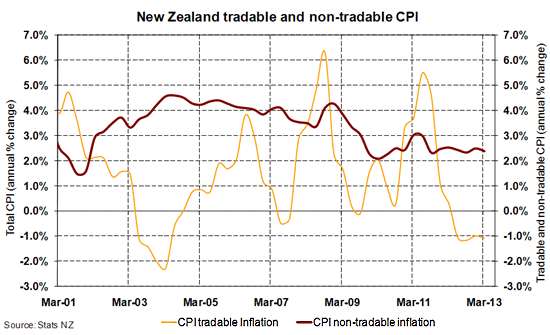
 By Roger J Kerr
By Roger J Kerr
The likely timing and extent of increases in New Zealand’s short-term interest rates has taken many twists and turns in recent years.
A weak US dollar exchange rate in global FX markets (resulting in an elevated NZD/USD exchange rate) and the Christchurch earthquakes put paid to any increases in 2010 and 2011 following the slashing of the OCR by the RBNZ to “emergency levels” of 2.50% at the time of the GFC in 2009.
The strong NZ dollar pushed tradable inflation down to offset ongoing non-tradable inflationary pressures in the domestic economy.
The higher currency value is effectively disguising other domestic economy price increases.
Persistent strength in the NZD currency value last year (2012) due to safe-haven capital inflows, a strong AUD and high commodity prices did not allow the RBNZ to consider monetary policy adjustments with interest rates as the high NZD had tightened monetary conditions already.
Today the US dollar is on strengthening path as the Federal Reserve confirms the likely timing of the withdrawal of monetary stimulus.
The Kiwi dollar has depreciated 10% against the USD over the last two months and already we are seeing consumers facing price increases, not decreases, on imported items.
The currency affect that has kept inflation low over recent years is now reversing, thus all economic forecasters will be revising annual inflation projections upwards.
Adding to the more complex forward inflation picture is growing demand/supply imbalances in the building sector.
Building costs are clearly heading one way and how they impact on non-tradable inflation and thus overall inflation over the next 12 months will be exercising inflation forecast models all around the place.
The strength of forward looking domestic economic data (e.g. consumer and business confidence surveys) adds fuel to the argument that the RBNZ run a real risk of being too complacent on future inflation risks.
Forward projections of capacity utilisation and the GDP output gap would reveal demand pressures in the economy that inevitably end up as increased inflation. Add on high agricultural commodity prices and a lower currency lifting domestic food prices (driven by export prices) and it is hard to see annual inflation remaining too long at its current +0.9% level.
To be fair, increases in inflation in the NZ economy have in the past come from the supply side (raw materials, electricity, commodity prices) much more than the consumer demand side that the RBNZ worry about with rising house prices.
On that score, it appears that the banks have not heeded the warnings on macro-prudential tools and the RBNZ will now implement the LVR regulation.
However, these changes are much more about bank/financial stability in a housing market downturn/bubble burst than about inflation control without increasing interest rates. However, it does perhaps buy some time for Mr Wheeler as I have commented on previously.
Depending on what the NZD/USD exchange rate does over coming months (assume it stays between 0.7500 and 0.8000) it looks likely that the OCR will be heading higher from January or March 2014. It will take that long for the RBNZ to be convinced that inflation will be closer to 2.5% by mid 2014 than their current forecast of 1.5%.
The current RBNZ inflation forecasts are based on an assumed 77.0 NZ dollar Trade Weighted Index. The TWI Index today is 73.5 and it is unlikely to increase back to 77.0 anytime soon.
The net/net result of the lower currency impact on inflation will be a sharply rising tradable inflation rate over coming months that, when combined with a sticky non-tradable annual inflation rate near to 3.0%, ends up with overall inflation above 2.0%.

-----------------------------------------------------------
To subscribe to our daily Currency Rate Sheet email, enter your email address here.
Roger J Kerr is a partner at PwC. He specialises in fixed interest securities and is a commentator on economics and markets. More commentary and useful information on fixed interest investing can be found at rogeradvice.com

We welcome your comments below. If you are not already registered, please register to comment
Remember we welcome robust, respectful and insightful debate. We don't welcome abusive or defamatory comments and will de-register those repeatedly making such comments. Our current comment policy is here.